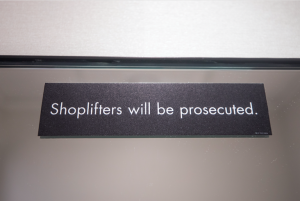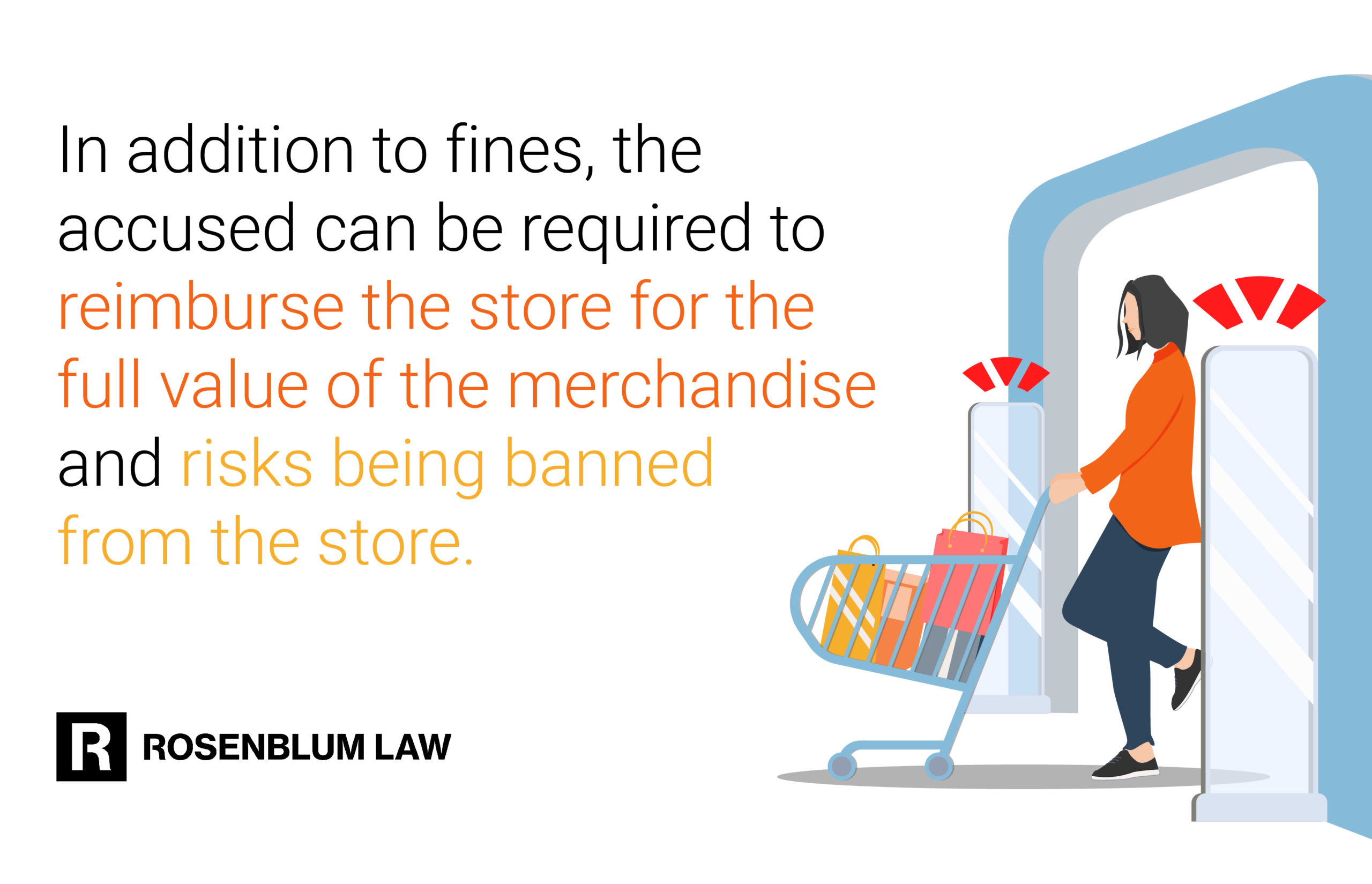
Shoplifting is one of the most common crimes that people are arrested for in New Jersey. Although most do not view it as a serious offense, they ought to. After all, it is a disorderly persons offense (misdemeanor) to be caught stealing an item worth less than $200 and an indictable offense (felony) to be caught stealing an item worth more than $200.
According to N.J.S.A. 2C:20-11, a person convicted of shoplifting faces a fine, jail time, and a criminal record. More than that, a conviction can cost a person his/her job and affect one’s immigration status. The good news is that, with the help of an experienced criminal defense attorney, a person could avoid a shoplifting conviction and all of the fallout that comes along with it.
 New Jersey Shoplifting Laws
New Jersey Shoplifting Laws
In New Jersey, there are five main kinds of shoplifting [N.J.S.A. 2C:20-11]:
- Purposely Taking Merchandise [N.J.S.A. 2C:20-11(b)(1)]: If a person purposely takes merchandise from a store with the intent to deprive the owner of its benefit (i.e. the value of the item) without paying for it, then he will be guilty of shoplifting.
- Concealment [N.J.S.A. 2C:20-11(b)(2)]: If a person purposely conceals merchandise that is being sold by a merchant, then he/she will be guilty of shoplifting. In order to “conceal,” a person must obscure the object in such a way that makes it not visible through ordinary observation. However, in order to count as shoplifting, the concealing must be done with the intent to carry out a theft. Usually, intent will be presumed whenever a person conceals merchandise that has not been paid for.
- Altering or Transferring a Price Tag [N.J.S.A. 2C:20-11(b)(3)]: If a person alters, transfers, or removes a label or price tag on a piece of merchandise, then he too can be guilty of shoplifting. However, in order to be found guilty, it must be proven that the accused had the intent to deprive the merchant of the true monetary value of the merchandise.
- Transferring Merchandise to Another Container [N.J.S.A. 2C:20-11(b)(4)]: If a person purposely transfers merchandise into a container with intent to commit a theft of that merchandise, then he/she will be guilty of shoplifting.
- Under-Ringing of Merchandise [N.J.S.A. 2C:20-11(b)(5)]: If a person causes the sale to reflect less than the full retail value of the merchandise (i.e. under-rings), then he/she will be guilty of shoplifting. Remember, the burden lies with the state to prove that the under-ringing was purposely done. Also, the preparation of fraudulent refund receipts is not encompassed within the offense of under-ringing sales receipts. The offense is directed to merchandise leaving a store, not merchandise being returned to a store.
 Penalties and Fines for Shoplifting in New Jersey
Penalties and Fines for Shoplifting in New Jersey
The penalties and fines a person accused of shoplifting will be liable for are affected by a variety of factors. These include the value of the stolen merchandise, whether it is a first offense, and if the person is a minor.
Types of Offenses
As with most theft crimes, the penalty is relative to the value of the property that was stolen.
- Disorderly Persons Offense: Stealing property that is worth less than $200 can result in a jail sentence of 6 months and a fine of up to $1,000.
- Fourth-Degree Offense: Stealing property that is worth between $200 and $500 can mean a prison term of up to 18 months and a fine of up to $10,000.
- Third-Degree Offense: Stealing property that is worth between $500 and $75,000 can mean going to prison for 3 to 5 years and being fined up to $15,000.
- Second-Degree Offense: Stealing property that is valued at more than $75,000 can result in 5 to 10 years in prison and a fine of up to $150,000.

Consequences for a First Offense
New Jersey considers shoplifting to be a serious offense. Still, it is among a number of charges that carry a presumption of non-incarceration. That means, in many cases, a person has a good chance of avoiding jail time for a first offense, depending on the amount stolen. There are many things a person being charged with shoplifting for the first time needs to know in terms of what to expect and what to do. Check out our information page for more details on first-time shoplifting charges in NJ.
Consequences for Juveniles
A juvenile in New Jersey (under 18 years of age) faces different consequences for shoplifting than an adult. A young person charged with shoplifting will most likely be tried in family court rather than criminal court and may be sent to a juvenile detention center rather than jail or prison. Still, the penalties are serious. Even if the youth is not sentenced to detention, the conviction can hamper his/her future for many years, making it difficult to get a job or get into a good school.
 How To Beat Shoplifting Charges
How To Beat Shoplifting Charges
The defense to a charge of shoplifting depends on the facts of the case, including the value of the goods stolen, the evidence against the accused, and other factors. For example, in State v. Smith, 480 A.2d 236 the defendant was prosecuted for shoplifting three pieces of bubble gum from a convenience store valued at $0.15. In this case, the court dismissed the offense as trivial (de minimis) based on multiple factors, including the amount stolen, the defendant’s clean criminal record, the damage done to the defendant’s reputation as a result of the charges, and the legal expenses the matter had incurred on him.

However, while the charges in Smith were dismissed as de minimis, this will not always happen in cases involving small dollar amounts, as in State v. Evans, 774 A. 2d 539. Here the defendant was convicted of shoplifting a hair bow valued at $12.50 despite her having purchased nearly $600 in other goods at the same store. The facts showed that the defendant had removed the tag from the bow and placed it in her hair prior to returning several items. She then proceeded to shop and try on clothing for more than an hour before making purchases which did not include the hair bow. When confronted by security, the defendant was “verbally abusive” and uncooperative. These factors weighed heavily in the judge’s decision to refuse to dismiss the charges as de minimis.
Of course, such a defense has little chance of working on goods with greater value, particularly when the total value qualifies as an indictable offense ($200+). Where applicable, it may be possible to disprove the accused intended to deprive the store of the merchandise’s full value. These cases are much more difficult and require the aid of a highly skilled attorney.
Remember that, most of the time, a person accused of shoplifting has likely been caught on camera from the moment he/she entered the store to the point at which he/she attempted to leave. This evidence often makes cases of shoplifting easy to prosecute and difficult to defend. As such, many individuals would be best served by having an attorney negotiate with prosecutors and the store managers to reduce the charges to a lesser offense, preferably a municipal violation. This offers the best chance of avoiding incarceration and a criminal record that could have a serious negative impact on one’s life moving forward.
Read our comprehensive ebook: Guide to Defending Against Shoplifting Charges in New Jersey
 How to Get a Shoplifting Charge Dismissed in New Jersey
How to Get a Shoplifting Charge Dismissed in New Jersey
There are a variety of ways to initiate a dismissal or at the very least reduce shoplifting charges. Speak to an experienced attorney about individual options to decide the best way forward.
De Minimis Dismissals
The defense to a charge of shoplifting depends on the facts of the case, including the value of the goods stolen, the evidence against the accused, and other factors. For example, in State v. Smith, 480 A.2d 236 the defendant was prosecuted for shoplifting three pieces of bubble gum from a convenience store valued at $0.15. In this case, the court dismissed the offense as trivial (de minimis) based on multiple factors, including the amount stolen, the defendant’s clean criminal record, the damage done to the defendant’s reputation as a result of the charges, and the legal expenses the matter had incurred on him.
However, while the charges in Smith were dismissed as de minimis, this will not always happen in cases involving small dollar amounts, as in State v. Evans, 774 A. 2d 539. Here the defendant was convicted of shoplifting a hair bow valued at $12.50 despite her having purchased nearly $600 in other goods at the same store. The facts showed that the defendant had removed the tag from the bow and placed it in her hair prior to returning several items. She then proceeded to shop and try on clothing for more than an hour before making purchases which did not include the hair bow. When confronted by security, the defendant was “verbally abusive” and uncooperative. These factors weighed heavily in the judge’s decision to refuse to dismiss the charges as de minimis. Of course, such a defense has little chance of working on goods with greater value, particularly when the total value qualifies as an indictable offense ($200+). Where applicable, it may be possible to disprove the accused intended to deprive the store of the merchandise’s full value. These cases are much more difficult and require the aid of a highly skilled attorney.
Remember that, most of the time, a person accused of shoplifting has likely been caught on camera from the moment they entered the store to the point at which they attempted to leave. This evidence often makes cases of shoplifting easy to prosecute and difficult to defend. As such, many individuals would be best served by having an attorney negotiate with prosecutors and the store managers to reduce the charges to a lesser offense, preferably a municipal violation. This offers the best chance of avoiding incarceration and a criminal record that could have a serious negative impact on one’s life moving forward.
Conditional Dismissal or Pre-Trial Intervention Programs
Conditional Dismissal and Pre-Trial Intervention (PTI) are probationary programs that individuals facing certain charges can apply for to help avoid a conviction. A person facing a shoplifting charge can apply for a diversionary program as an alternative to trial or a plea bargain. Only those who have not already enrolled in a diversionary program and who have not been convicted of an indictable offense are eligible. Not everyone who applies will be accepted which is why it’s vital to hire an attorney to increase one’s odds of getting accepted. Each program is customized for the individual based on the facts of the case and can include random drug testing, supervision, community service, and counseling. Those who successfully complete a program will have the charges against them dismissed—meaning they will avoid having a criminal record. Read more about PTI programs in New Jersey.
Benefits of Hiring an Attorney
Aside from the legal expertise and experience an attorney brings to any case they take on, in a shoplifting case they will also: thoroughly review the facts of the case to identify potential grounds for getting the charges dropped, skillfully negotiate with prosecutors and store managers to seek a reduction in charges to a lesser offense that won’t result in a criminal record, and strategically work to increase the likelihood of being accepted into a probationary program as an alternative to harsher penalties.
Expunge A Shoplifting Conviction
Additionally, an attorney can assist with the expungement process for both disorderly persons and indictable offenses if the person filing meets all other criteria. A disorderly persons-level shoplifting charge can be expunged 4 years after the accused has completed all sentencing and paid any fines. Indictable-level shoplifting charges can be expunged 6 years after all sentencing and fines have been satisfied. Learn more about expunging shoplifting convictions.
Shoplifting Attorney Fees in New Jersey
Shoplifting attorney fees in New Jersey can vary based on factors like your location and the specific court handling your case. To get an accurate estimate, consider scheduling a free consultation with our expert criminal defense lawyers. Go to our website or call 888-815-3649 to schedule your free consultation.
Case Law Analysis
Who Should I Contact?
If you, your child, or another loved one was charged with shoplifting in New Jersey, contact Rosenblum Law today. Our expert criminal defense attorneys have helped many people in similar situations avoid the worst possible consequences. E-mail or call us at 888-815-3649.
Ebook
Read our comprehensive eBook: Guide to Defending Against Shoplifting Charges in New Jersey
 Frequently Asked Questions
Frequently Asked Questions
Yes, a person can face up to 6 months in jail for shoplifting goods worth less than $200, up to 18 months in prison for goods worth between $200 and $500, 3 to 5 years in prison for goods worth $500 to $75,000, and as much as 10 years in prison for goods worth more than $75,000. A person can also face fines and be required to reimburse the merchant for the stolen goods.
Never plead guilty to a shoplifting charge in New Jersey, even for a first offense! Even if the judge is lenient and does not issue a jail sentence, the accused will have a permanent criminal record which can impact the ability to get a job or attend school. Instead, one should hire an experienced criminal defense attorney who can attempt to negotiate or dismiss the charge to a lesser offense, ideally one that won’t result in a criminal record.
It is possible to get a shoplifting charge dropped, but it is unlikely to happen without a strong legal defense. If the person has been caught on camera deliberately pocketing or removing a price tag from an item then there is little chance of this. An attorney can help review the facts of the case to determine if there is a way to get charges dropped. If this is not possible, a person may need to negotiate with prosecutors to reduce the charges to a civil offense.
The moment a person realizes that he/she has accidentally taken something from a store without paying, he/she must make an effort to return it. However, if security intercepts the shopper first, he/she may face a charge of shoplifting. While mistakes happen, most genuine shoplifters claim it was an accident in the hopes of getting off without charges. As such, it often falls on the shopper to prove his/her innocence, a standard that flies in the face of being “innocent until proven guilty.”
Most shoplifting cases are charged as disorderly persons offenses. If the value of the goods stolen is more than $200, however, then a person can be charged with a felony (indictable) offense.
As previously mentioned, shoplifting is a misdemeanor when the merchandise stolen is valued at less than or equal to $200, a disorderly person’s offense. In such a case, it is considered a Class B misdemeanor, punishable by up to 6 months of jail time and up to $1000 in fines.
Yes. A lawyer will be familiar with all of the different directions your case could go and will advise you on the best strategy to reduce the charges as much as possible. They will also take care of communications, negotiations, and staying on top of deadlines and court proceedings.
MORE INFORMATION ABOUT SHOPLIFTING IN NEW JERSEY
- Shoplifting Frequently Asked Questions
- First Time Shoplifting
- Juveniles Caught Shoplifting
- Shoplifting And Its Effect On Your Immigration Status
- Shoplifting at Malls in New Jersey
- Westfield Garden State Plaza
- Willowbrook Mall
- Short Hills Mall
- Shoplifting from Target in New Jersey
- Shoplifting from Walmart in New Jersey
- Shoplifting from JCPenney in New Jersey
- Shoplifting From ShopRite in New Jersey
- Shoplifting From the American Dream Mall in New Jersey
- Shoplifting From Macy’s in New Jersey


